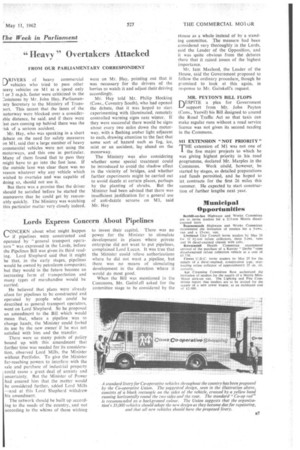Lords Express Concern About Pipelines
Page 33

If you've noticed an error in this article please click here to report it so we can fix it.
CONCERN about what might happen if pipelines were constructed and operated by "general transport operators" was expressed in the Lords, before the Pipelines Bill was given its third reading. Lord Shepherd said that it might be that, in the early stages, pipelines would be owned by petroleum companies; but they would in the future become an increasing form of transportation and many types of merchandise would be carried.
He believed that plans were already afoot for pipelines to be constructed and operated by people who could be described as general transport operators, went on Lord Shepherd. So he proposed an amendment to the Bill which would mean that, where a pipeline was to change hands, the Minister could forbid its use by the new owner' if he was not satisfied with him and the transfer.
There were so many points of policy bound up with this amendment that further time was needed for its consideration, observed Lord Mills, the Minister without Portfolio. To give the Minister far-reaching powers to interfere with thesale and purchase of industrial property could cause a great deal of anxiety and uncertainty. But the Minister of Power had assured him that the matter would be considered further, added Lord Mills —and at this Lord Shepherd withdrew his amendment.
The network should be built up according to the needs of the country, and not according to the whims of those wishing to invest their capital. There was no power for the Minister to stimulate development in places where private enterprise did not want to put pipelines, complained Lord Lucan. It was true that the Minister could refuse authorizations where he did not want a pipeline, but there was no means of stimulating development in the direction where it would do most good.
When the Bill was mentioned in the Commons, Mr. Gaitsl.ell asked for the committee stage to be considered by the House as a whole instead of by a standing committee. The measure had been considered very thoroughly in the Lords, said the Leader of the Opposition, and it was quite obvious from the debates there that it raised issues of the highest importance.
Mr. lain Macleod, the Leader of the House, said the Government proposed to follow the ordinary procedure, though he promised to look at this again, in response to Mr. Gaitskell's request.
MR. PEYTON'S BILL FLOPS
DESPITE a plea for Government support from Mr. John Peyton (Cons, Yeovil) his Bill designed to amend the Road Traffic Act so that taxis can make regular runs without a road service licence was not given its second reading in the Commons.
1111 EXTENSION "NOT PRIORITY"
THE extension of MI was not one of the five major projects to which he was giving highest priority in his road programme, declared Mr. MarpIes in the Commons. Work could, however, be started by stages, as detailed preparations and funds permitted, and he hoped to let contracts for the first 26 miles this summer. He expected to start construction of further lengths next year.




































































































